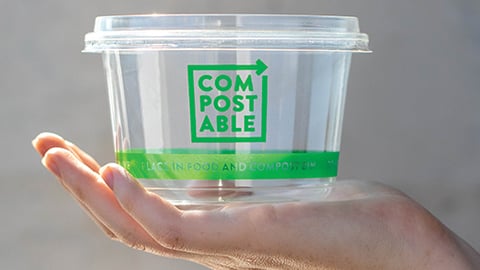The Pressure's On in Packaging
At a time of greater interest than ever in packaging safety, manufacturers of solutions employing high pressure processing (HPP), also known as high pressure pascalization or cold pasteurization, a non-thermal food and beverage preservation method that guarantees food safety and achieves an increased shelf life while maintaining the optimum attributes of fresh products, offer attractive options for retailers and consumers.
“Today, consumers demand food and beverages with specific characteristics: higher sensory and nutritional quality, absence of additives and preservatives, ready to eat, with a long shelf life and 100% safe,” noted Anthony Zapata, marketing and sales specialist at HPP equipment and technology provider Hiperbaric, based in Burgos, Spain, with U.S. offices in Miami. “HPP maintains freshness of food products up to three months after being packaged.”
Playing It Safe
In regard to contamination, “HPP destroys pathogens (Salmonella, E. coli, Listeria, Vibrio, norovirus, etc.) and spoilage microorganisms (lactic acid bacteria, coliforms, etc.), meeting FDA and USDA requirements in validation studies,” said Zapata. “Also, because the process takes place in the product’s final packaging, unlike heat pasteurization, there is no possibility of re-contamination. This helps assure any possibility of a pathogen-related outbreak, ultimately giving food manufacturers brand protection and the customer peace of mind that they are consuming a safe product.”
“HPP is especially effective in reducing the risks associated with E. coli, Listeria and Salmonella, without adding the potential downside effects of heat pasteurization such as vitamin content reduction, product color change and taste change,” observed Tom Woodward, chief commercial officer at Villa Rica, Georgia-based Universal Pure, the largest provider of third-party HPP, cold storage, and pre- and post-HPP value-added services.
Does that mean that HPP packaging can’t transmit the coronavirus?
“Unfortunately COVID- 19 is a new virus, and research about it is still scarce, even more with HPP,” cautioned Carole Tonello Samson, Hiperbaric’s commercial and applications director. “Still, it is known that HPP effectively inactivates a variety of enveloped viruses (like COVID-19) such as avian influenza virus, herpes simplex virus type 1, human cytomegalovirus, vesicular stomatitis virus and avian metapneumovirus. So, it is possible COVID-19 is pressure inactivated, but this has not been demonstrated.”
The Case for HPP
Expanding on the advantages of HPP for all stakeholders, Woodward noted that it “provides for safer food products and extended shelf life, which allows brands to ship safe products great distances while still offering the retailer and consumers sufficient time to merchandise and consume high-quality and premium foods. The distributors, cold-chain service providers, brands and retailers who recognize and utilize a strong and efficient distribution chain should be able to leverage HPP to provide high-quality and premium-priced products.”
He added, “HPP is a proven technology to provide food safety, and should provide retailers and consumers with a high level of confidence in the integrity of their foods.”
“The ability to maintain the taste and nutrition profile of a wide variety of fruits and beverages while severely degrading pathogens is a strong positive … along with extended shelf life and clean product ingredient labels,” observed Tom Egan, of the Cold Pressure Council (CPC), of which Hiparbaric and Universal Pure are both members. “The use of the High Pressure Certified mark by CPC members quickly conveys these values.”
This year, “we anticipate HPP use will continue its strong growth,” predicted Egan, who, in addition to his CPC role, is VP, industry services with Herndon, Virginia-based PMMI, The Association for Packaging and Processing Technologies. “We also expect more product segments will utilize HPP for their products. In addition, for product operations, continuing improvements in capability and throughput will help food and beverage companies make the move to HPP.”






